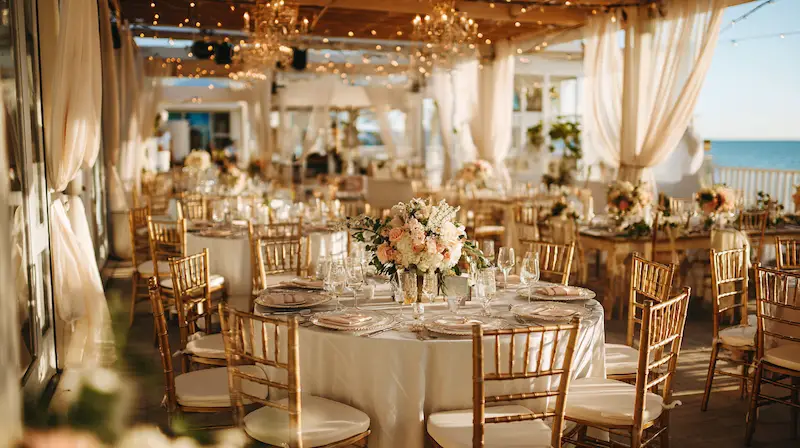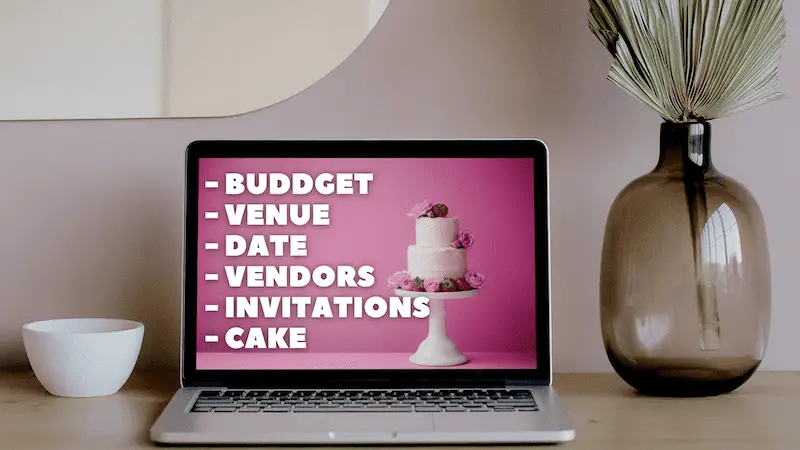How To Plan A Wedding Without a Wedding Planner: 16 Tips
Planning your wedding requires organization, creativity, and time management skills.
For this reason, about a third of couples prefer to hire a professional wedding planner to take care of most of the details for them.
But don’t panic if you don’t have that luxury. There are approximately 2.5 million weddings in the US each year, and obviously, the big majority of them came together without the help of a professional.
Planning can seem overwhelming, but there are many ways to do it.
It starts with you!
Here are some tips that will help keep you stay on track and have an amazing wedding.
1. Find A Reputable Wedding Venue
Do your research.
Selecting a well-established venue will win you half the battle, if not more, and set your wedding up to a great start.
A renowned venue will typically have a long-established team with experienced on-site staff that knows all the ins and outs of running a successful wedding. That will be an invaluable asset to you.
A venue with a well-rehearsed staff will carry your wedding through and catch up even if the ceremony went a little longer, or you need last-minute seating adjustments or made a mistake on the timeline because they have seen it all and can handle most of the changes.
Weddings can run themselves when they are hosted at a great venue by skilled staff.
2. Work With An Experienced Catering Sales Manager
Skilled staff includes working with an experienced Catering Sales Manager.
Usually, the person taking your wedding at a hotel or another venue has been vetted, hired, and trained well by the location’s management before trusted with the responsibility of your event. So you are not just getting anyone.
Catering managers at those venues know how to create the perfect menu for your wedding, anticipate any special needs, and plan out all the details concerning the location.
They also understand the unique design elements that make up their venue’s space, so there are no surprises like having no space left for dancing, and you only find out after submitting your final guest count that there is no room to make the dance floor bigger.
You find many catering managers who also handle corporate events and other types of events as part of their job.
This is a good thing since they bring in a lot of experience from different types of events and know how to handle all of the moving parts.
But understand that a catering sales manager cannot replace a wedding planner if you need a more extensive and direct relationship.
Catering sales managers work primarily for their employer and represent the venue’s philosophy and business model. On the other side, a wedding planner is being hired by you and relates to you directly without any filters from the venue’s perspective.
But again, working with an experienced catering sales manager is all you need to get your wedding planned out to the smallest detail pertaining to the venue, and you will be in good hands.
3. Use The Venue’s Existing Inventory Of Equipment
Wedding planners are a fantastic source of ideas for your wedding.
Amongst many other things, their services typically include handling logistics, creating timelines, designing, suggesting rental chairs and tables, finding unique flatware, china, and glasses to providing special table linens, and setting up the whole architecture of your wedding.
However, it may be unnecessary to rent all the equipment in most cases since the bulk of it is already available at your wedding venue.
Instead of replicating a specific look “to a t” that you found in a glossy magazine or on Pinterest, you can often recreate your personal version of it by getting inspired by some of the design accents and make good use of the location’s existing linens, tables, silver, glasses, and chairs, and save thousands of dollars of costs renting these items.
4. Keep Continuous Track Of What You Are Doing
Your wedding journal or wedding planning app will be your closest ally when it comes to staying organized.
It’s immeasurable important to keep thoughts flowing, recorded, and organized somewhere that you can always fall back on them.
Wedding planning includes a myriad of details.
There will be many overwhelming moving parts initially, and you will ask yourself how this is ever coming together?
Many couples wonder whether they have asked all the right questions, if they crossed all the “t’s and dots,” or if they have completely overlooked something.
A wedding planner will be your safety net. But if you don’t have one, the best way to stay on top of things is by keeping perfect records.
Have your wedding journal/app handy for quick note-taking, jogging your mind, reviewing topics, keeping up with deadlines, and working through layers of decision-making.
5. Pick A Venue You Don’t Have To Redesign
When you are planning your wedding without the help of a wedding planner, it is smarter to pick a venue that is already done and styled.
This will help you save time planning, budgeting, avoiding redesign, or building a backdrop from scratch that might not end up being what you originally envisioned for your wedding anyway.
A modern Manhattan loft with unbelievable views over the Hudson may be enticing at the beginning. But will you be able to warm up a space for your wedding that is made of concrete floors, walls, and ceilings with exposed pipes?
Picking the right venue is important when you are planning your wedding on your own. Just keep in mind all the other things that come with planning a wedding, so you are not ending up disappointed.
Find one that has been done and designed already so you can focus on making it perfect instead!
6. Pick Established And Experienced Vendors
When scouting for a venue, don’t forget to ask about their preferred vendors’ list.
The venue may have a long-standing relationship with certain professionals in the industry that will bring an extra level of expertise and assurance to your wedding.
If you are doing your own research, use established wedding websites that list and review the best local vendors.
When it comes to music, you should also look for wedding entertainment agencies that will be a one-stop shop for various bands, DJ and music for the ceremony.
Start finding vendors as soon as you have a date reserved and confirmed. The best vendors in town book up first. That is especially true for music and photography since they can only do one gig at a time. Florists, however, can often furnish several events at different locations.
7. Without A Wedding Planner, Don’t Bite Off More Than You Can Chew
You have probably started your Pinterest page with some amazing images and inspirations. These layouts and beautiful setups typically require an army of people.
Do not be tempted to copy the ideas without careful consideration of your own abilities to create and execute them.
Usually, time also is not on your side when it comes to finishing homemade crafts.
Plan for a realistic number of DIY projects that you will attempt.
Also, it is important to figure out the delivery, possible overnight on-site storage, moving items from on-site storage to the ballroom, setup, and breakdown time you need at the venue.
As you are getting ready for your ceremony doing makeup and hair, you should not worry about arranging additional details at the venue.
You want to be free from any type of distraction about the setup that would involve you on the day of your wedding. Otherwise, you may very well overextend yourself and the staff at the venue.
8. Make Sure You Have Your Wedding Vendors’ Contact Information At Your Fingertips
Once you have your vendors’ team selected, you want to have a good relationship with them during the months and weeks leading up to your wedding because they will be a big part of carrying your event.
Make certain you studied their contracts, terms & conditions, and are aware of any overtime fees, when and how they apply.
Do a thorough run-through with each vendor a few days before your wedding to check they know the ins and outs of the venue, their setup place, delivery entrance, timing, and have them provide their certificate of liability insurance if required.
On the wedding day, have all the vendor’s contact info handy, on speed dial, starting with the officiant, musicians for the ceremony, catering sales manager, florist, photographer, videographer, DJ or band, photo booth people, to name the most important ones.
When someone is running late, you don’t want to start looking for their phone number.
9. Be Sure To Confirm A Lot Of Communication With Your Wedding Vendors In Writing
Whether or not you hire a wedding planner, you are ultimately in charge of your wedding.
When you start vetting different venues, vendors, and caterers, you will likely find that some of them are not as responsive and communicative as you like.
At this time, it is important to get quotes and details in writing so that you can better compare them to each other, and equally important, keep vendors accountable for what they said on the phone.
You also need the written information handy and organized since it is easy to mix up different vendors and hold them to a quote that they may never have agreed to. Hence the written confirmation.
Start with a file folder for all your planning paperwork, including quotes and contracts, as well as vendor lists (people you are in touch with regularly).
You should also create an email address just for this so that everything stays organized and accessible.
10. Meet All Deadlines Leading Up To Your Wedding Day
Creating self-imposed deadlines will help you stay on track and move from one task to the next.
The deadlines set by your vendors are included here as well.
There will be dates by which contracts must be completed and returned, including deposits and prepayment of the full outstanding balance.
As you work with your vendors, don’t miss these milestones, as it may result in your plans being delayed or, worse, dropped.
Also, keep track of the dates by when you have to submit your final menu selections to the caterer, the final decision on flowers, special lighting, the design and size of your wedding cake, and most importantly, the final guest count and table assignments to the venue.
11. Take Days Off From Wedding Planning
Handling many moving parts at the same time can be exhausting. If you are working, you also may be balancing other responsibilities and can’t always give your full attention to your wedding.
Plan a few days off from wedding planning whenever possible so you can recharge.
You should also set aside time in advance for activities with friends or family that might help relieve some of the stress.
Focus on getting the big-ticket items off your list as soon as possible (securing a venue, church, vendors, attire) and then work on fine-tuning the details of how everything will unfold after that.
12. Read Each Vendor Agreement – Especially The Fine Print
Take your time reading the fine print, terms & conditions, of each agreement you will sign.
Whether you hire a wedding planner or not, make sure you call your vendors if you have any questions about certain aspects and verbiage in the paperwork.
Make sure you understand when overtime applies, what your financial responsibility is if you had to cancel the event, and what possible hidden costs are not listed on the contract that some venues only reveal on a need-to-know basis because they may not apply at the time of the booking (i.e., extra labor costs, early set up fees, surcharges for vendor meals, shadow fees for labor in venues with union labor).
13. Avoid Micromanaging Vendors, Friends & Family On Your Wedding Day
Yes, you are paying the bill for your wedding, and everything must be coming together as planned.
However, trust your vendors that they are professionals and know how to make the day go as planned.
No one wants a micromanaging type of person while they are doing their job on the day of the event.
If something needs to be changed or altered, make sure that they know ahead of time, so there are no surprises on the wedding day.
Plan your reception timeline with enough room for error in case something unexpected happens on the big day!
The secret sauce is called planning and organization ahead of time.
14. Be Yourself And Stay Authentic During The Wedding Planning Process
When you’re planning a wedding without a wedding planner, you will be wearing multiple hats at a time, and it may be challenging to remain authentic when trying to get your point across.
Don’t be afraid to ask for help, and don’t feel guilty about asking for your mom or sister’s assistance with something they said they could do!
Wedding planning stress can do a number on your mental and emotional strength, and when you don’t even recognize yourself, it’s time to step back and re-evaluate.
Plan your wedding timeline around what makes you happy: if all of that planning isn’t your thing, then hire someone else to do it!
15. Consider A Day-off Planner
Many months of planning will finally crystalize into one day.
It is one of the greatest days of your life, and you deserve to enjoy it fully.
If you have planned all the details with your wedding venue’s catering manager, vendors, friends & family, you should be off to an amazing day.
To make it even more enjoyable, consider hiring a Month- or Day-of wedding planner to take care of your day-of timeline and any final details so you can savor your last moments as a single couple.
You should give the month- or day-of planner all the details of the wedding plenty of time before the wedding and introduce them to the venue’s catering manager and vendors.
The planner will coordinate with your other vendors, help with the ceremony, manage your timeline, troubleshoot and adjust details as needed and work closely with the venue’s catering manager.

16. Make The Most Of Your Couple Power
The vast majority of couples have never been trained to plan an elaborate event out of thin air and expect it to be like the academy awards while they only get one shot at getting it right.
It may seem like a trial by fire for a couple to plan a wedding, but it is also a transcending bonding experience.
Planning something as big as a wedding is going to deepen and strengthen your relationship.
There is no one else who will have your back the way you do with each other, so make sure to capitalize on your partnership to get through it all.
Plan every facet of your wedding together-even if it’s just for fun!
Final Thoughts
Plan ahead, take your time, and communicate with each other as a couple and with all your vendors throughout every step!
It’s all worth the hard work.
Resources
https://en.wikipedia.org/wiki/Wedding_industry_in_the_United_States


